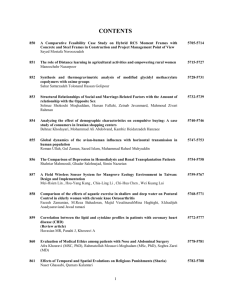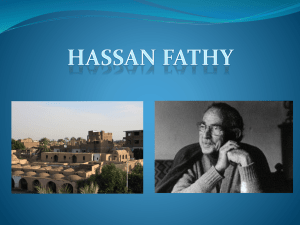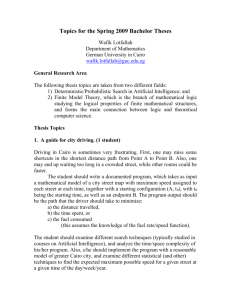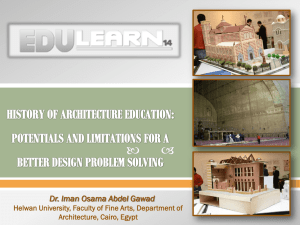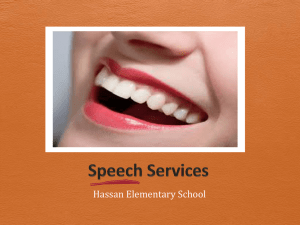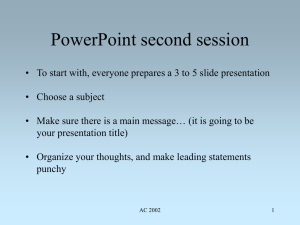View/Open - AUC DAR Home - The American University in Cairo
advertisement
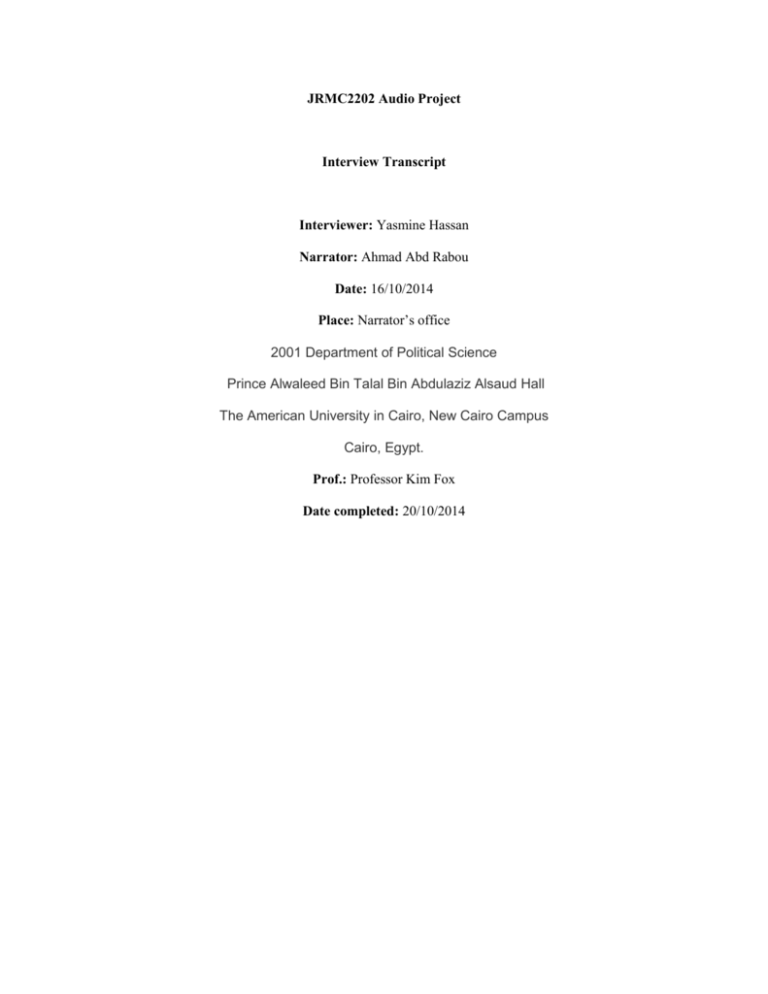
JRMC2202 Audio Project Interview Transcript Interviewer: Yasmine Hassan Narrator: Ahmad Abd Rabou Date: 16/10/2014 Place: Narrator’s office 2001 Department of Political Science Prince Alwaleed Bin Talal Bin Abdulaziz Alsaud Hall The American University in Cairo, New Cairo Campus Cairo, Egypt. Prof.: Professor Kim Fox Date completed: 20/10/2014 Yasmine Hassan Ahmad Abd Rabou Interview 1/6 16 October 2014 Persons Present: Yasmine Hassan - I Ahmad Abd Rabou - S Hassan: Could you please tell me your name, your title, your age, and your place of ref, umm, residence? Abd Rabou: My name is Ahmad Abd Rabou. I’m assistant professor of comparative politics at both Cairo University and The American University in Cairo. I’m 34 years old. I live in Rehab City in New Cairo Egypt. Hassan: Professor Abd Rabou, being a current professor of political science in both Cairo University and AUC, can you underline any major differences in the mentality or the political orientations of the students in both? Abd Rabou: Sure. First of all, let's look at the socioeconomic structure of the students at both campuses. It's a little bit different. For example, in the American University in Cairo, usually people, not everybody but I'd say the majority, are upper middle classes. And then, most of them, not all again but most of them, have this kind of, like, societal safe exits and inputs, which means that they feel that after graduation they can secure jobs somehow, umm. They--Most of them are coming-Again, the majority of them are coming from liberal schools so to speak; so they share such kind of liberal ideas. And they, again, finally coming from the upper Yasmine Hassan Ahmad Abd Rabou Interview 2/6 middle classes even if they still come from country side and, I mean, places that are not Cairo and Alexandria and other big Urban places. For Cairo University, it’s totally different situation. You've people coming from different segments of the society; upper middle, middle and lower middle and even poor people. And they are representing different places geographically, especially where schools have no other counterparts like the school I join at Cairo University: The School of Economics and Political Science. It has no other counterpart in different places; so nationwide students will be joining there. And students there are coming from more conservative backgrounds compared to AUC. Again, I am just touching upon the majority; let's say the average student with exceptions both here and there. And they finally--They--They don't feel such kind of safe networks. They are not safely networked in the society. So they feel they should do much better, they should exert much more efforts in order to catch much better opportunities after graduation. So this is ( . . . . ). Hassan: So from this point of the differences of social classes, do you agree with this claim that AUC students are kind of detached from the Egyptian reality? Abd Rabou: No. I don't--It depends --Like my--This is my second year. Actually, I am starting now my third year at AUC. I would say it's not for everybody, umm. But, still, you have at least 30 to 40 % of my students are kind of detached from the Egyptian reality. Some of them has been taught in non Egyptian education. Some of them even didn't spend any time in Egypt. Most of them--Some of them are coming from Gulf countries for example. This is one. But if I compare the Yasmine Hassan Ahmad Abd Rabou Interview 3/6 situation before the revolution or even the situation when I was a student at Cairo University attending some courses at AUC, that was back 13-14 years ago, I think the American university in Cairo students are getting much more in touch with the Egyptian reality compared to 15 years ago. This is what I can see from the performance of my students now. They are getting much more closer to the reality. But, compared--I mean comparatively speaking, if we compare them to Cairo students, yes somehow the majority of students here are somehow a little bit far away from ( . . . . ). Hassan: So, as political science students, does this make them less politically mature than those of Cairo University? Abd Rabou: Less, not mature, they are politically mature but less politically engaged. So they don't feel they have to be engaged in the society, they have to be engaged in politics, which is totally different at Cairo University. But for maturity, I--I both--At both campuses, I face same problems. You have people who are totally immature when it comes to basic facts of politics. Given the fact that I am teaching political science, so finally, at least I expect people with a basic knowledge. But I face same scenarios at Cairo University; so I think it is more of political participation and political engagement more than political awareness or maturity. Hassan: Since you are an active politician and writer, do you ever feel that, umm, expressing your opinions freely or taking sides, umm, in the newspapers, and your Yasmine Hassan Ahmad Abd Rabou Interview 4/6 own publications, and the social media could affect your objectivity as a political science professor? Abd Rabou: It does somehow. What I do is--First of all I am not really--I don't--At least, I don't consider myself a politician. I'm not joining any political party but I'm a writer. I'm kind of political activist, and of course it does affect my situation. But the point here is I am trying my best, not 100%, but I’m doing my best to detach my point of views at classes from point of views I write or I expose to media, whether written media or seen media, etc. This is one. Second, even when I go to the media, I try--I do my best to make my opinions kind of objective. So I'm trying to play this political analyst rather than a political politician. So if you compare for example Amr Hamzawy who is my senior colleague; he is politician simply because he run for parliamentary elections. He was a parliamentary. He was a deputy in the parliament. So, it's a little bit different scenario. I didn't go that far, yet. Hassan: But you are characterized with, somehow a sarcastic way of criticism, especially on the social media. So, doesn't this affect somehow when you--when you deal with the students? Specially that-- . Abd Rabou: So far I didn't get--So far--Maybe it does. I don't know. Maybe students are not telling me this. But Ok, we have to differentiate two different platforms; when I write for media, for example Al Tahrir newspaper, Al Shorouk newspaper or when I go for some talk shows, and what I write on my own page on facebook. Yasmine Hassan Ahmad Abd Rabou Interview 5/6 Yes, my own page on facebook is very sarcastic, is very like--. I just speak out my mind as it goes. So this is not--I wouldn't say that this is my identity in the society in general. It's only for my webpage which is not--I mean, I'm sorry, my facebook page which is not that much exposed. It's nothing to be compared, if I go to the media or if I write in some other platforms like Al Shorouk or Al Tahrir. This is one. Second, I didn't--So far, I didn't face any single scenario of students getting upset or so. Hassan: Ok. Thank you so much for your time. And thank you for giving us the opportunity of doing this interview. Abd Rabou: Thank you. You are welcome. Hassan: Thank you.
